The Palestine War.
The fighting which has taken place in Palestine during the week succeeding the end of the mandate has had the initial result of dividing the country into two armed camps, more or less along the lines of partition recommended by the United Nations. Certain conquests on either side, however, show that this result is accidental ; Acre, which should have been part of the Arab state, has fallen to the Jews, and the Negev, which was allotted to the Jews, has been overrun by Arab forces. In no part of the country has there yet been a pitched battle between the Jews and any of the regular troops of the neighbouring Arab States. Tragically enough, it looks as if the first clash- is likely to take place in Jerusalem, where armed Jews have overrun the new city and the Arab Legion has penetrated into the Old City. The position of the Arab Legion, which is to a certain extent financed and officered by Britain, will need some clarifying, particularly if the British Government decides to recognise the Zionist State. It is not to be expected that the Legion, or for the matter of that the armies of Egypt and Iraq (which are still theoretic- ally allies of this country) can be dissuaded by argument from par- taking in what they have always considered the one entirely justifi- able war. But chaos is contagious, and the longer chaos persists in Palestine the more dangerous it becomes to the peace and well-being of the Middle East as a whole ; and it cannot be too often repeated that this country stands to lose more than any other by a breakdown of government in that area. About President Truman's precipitate recognition of Israel, which took even the American delegation at Lake Success by surprise, the less said the better. It was as inept and unhelpful as his original demand for the introduction of too,000 immigrants two years ago. It could only be justified if the American Government had decided that there was no longer any chance of achieving anything useful through the machinery of the United Nations. And, though most aspects of American policy on Palestine are obscure, there is no sign that such a decision has been reached. On the contrary, Mr. Warren Austin has invoked in regard to Palestine Article 39 of the Charter, which leads on to Article 42, involving the use of armed force by the United Nations against States pronounced guilty of aggression. Sir Alexander Cadogan had no difficulty in demonstrating that such a step was as impracticable as it is premature.



































 Previous page
Previous page